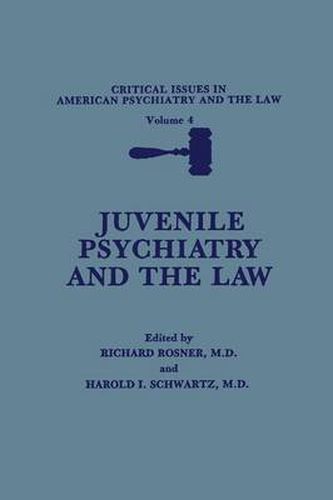Readings Newsletter
Become a Readings Member to make your shopping experience even easier.
Sign in or sign up for free!
You’re not far away from qualifying for FREE standard shipping within Australia
You’ve qualified for FREE standard shipping within Australia
The cart is loading…






This title is printed to order. This book may have been self-published. If so, we cannot guarantee the quality of the content. In the main most books will have gone through the editing process however some may not. We therefore suggest that you be aware of this before ordering this book. If in doubt check either the author or publisher’s details as we are unable to accept any returns unless they are faulty. Please contact us if you have any questions.
I am not sure when a series of volumes becomes an institution ; this is the fourth annual volume of Critical Issues in American Psychiatry and the Law, and each has been an extraordinary summary of important forensic topics. This book makes the point that the interface of psychiatry and law is not merely a legal one, but has a great deal to do with clinical issues such as diagnosis and treatment. Children and adolescents are not adults. This may come as something of a shock to those who proselytize for equal rights for children, and to those adults (including some psychiatrists, attorneys, and judges) who advocate giving the child adult choices and/or responsibilities. Children differ from adults in many ways. The specialist in child or adoles cent psychiatry knows not only that one must attend to special social and family issues for juveniles, but that juveniles are more complex internally as well. They attempt to survive in the world while rapidly growing and learning, usually with physically and emotionally immature resources. They have had few years in which to develop experience, and do not have the psyche with which to integrate that experience in ways one would expect of a mature adult. Sometimes this frightens the patient, as in the case of a physically large teen ager whose impulse control is impaired. Sometimes it is frustrating, as in the case of a healthy child unable to escape from a dysfunctioning family. It is always confusing, and usually uncomfortable.
$9.00 standard shipping within Australia
FREE standard shipping within Australia for orders over $100.00
Express & International shipping calculated at checkout
This title is printed to order. This book may have been self-published. If so, we cannot guarantee the quality of the content. In the main most books will have gone through the editing process however some may not. We therefore suggest that you be aware of this before ordering this book. If in doubt check either the author or publisher’s details as we are unable to accept any returns unless they are faulty. Please contact us if you have any questions.
I am not sure when a series of volumes becomes an institution ; this is the fourth annual volume of Critical Issues in American Psychiatry and the Law, and each has been an extraordinary summary of important forensic topics. This book makes the point that the interface of psychiatry and law is not merely a legal one, but has a great deal to do with clinical issues such as diagnosis and treatment. Children and adolescents are not adults. This may come as something of a shock to those who proselytize for equal rights for children, and to those adults (including some psychiatrists, attorneys, and judges) who advocate giving the child adult choices and/or responsibilities. Children differ from adults in many ways. The specialist in child or adoles cent psychiatry knows not only that one must attend to special social and family issues for juveniles, but that juveniles are more complex internally as well. They attempt to survive in the world while rapidly growing and learning, usually with physically and emotionally immature resources. They have had few years in which to develop experience, and do not have the psyche with which to integrate that experience in ways one would expect of a mature adult. Sometimes this frightens the patient, as in the case of a physically large teen ager whose impulse control is impaired. Sometimes it is frustrating, as in the case of a healthy child unable to escape from a dysfunctioning family. It is always confusing, and usually uncomfortable.